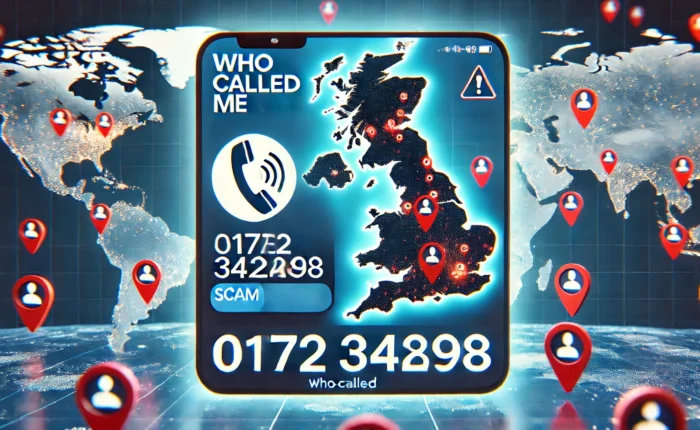01772342898: Scam Alert! How to Stay Safe from Fraud Calls

How to Protect Yourself from Phone Scams
Phone scams have become increasingly common, targeting unsuspecting individuals with fraudulent schemes. Scammers use various deceptive tactics to steal personal information, money, or both. These scams often come in the form of fake calls from banks, government agencies, or well-known companies, making them appear trustworthy.
Victims are often pressured into providing sensitive information or making quick financial decisions. It is essential to stay vigilant and take proactive steps to avoid falling victim to these scams. By educating yourself on how scammers operate, you can protect yourself and your loved ones from financial loss and identity theft.
1. Avoid Sharing Personal Information Over the Phone
Why Scammers Ask for Personal Information
Scammers often pose as representatives of banks, government agencies, or reputable companies to extract details such as Social Security numbers, bank account details, credit card information, login credentials, and home addresses. They use persuasive language and urgency to manipulate victims into revealing private details. read must 07701 407206: HMRC Scam Call That Could Cost You Money
How to Protect Yourself
If a caller requests sensitive information, always hang up and verify their legitimacy by contacting the organization directly through its official website or customer service number. Legitimate organizations will never ask for sensitive information over the phone without prior verification.

2. Be Skeptical of Unsolicited Calls
Common Tactics Used by Scammers
Scammers frequently create a sense of urgency, pretending to be law enforcement officers, tax agencies, or tech support personnel. They may claim you are in trouble and must act immediately. Some scams lure victims by offering fake lottery winnings, investment opportunities, or fake prizes.
How to Respond
If you receive such calls, do not engage with the caller. Legitimate organizations will never pressure you to provide sensitive information or make urgent payments over the phone. Always verify claims independently before taking action.
3. Report Scam Calls to the Proper Authorities
Importance of Reporting Scam Calls
Scammers rely on anonymity to continue their fraudulent activities. By reporting scam calls, you contribute to law enforcement efforts to track and stop these criminals.
Where to Report Scams
You can report scams to:
- Federal Trade Commission (FTC) at www.reportfraud.ftc.gov
- Federal Communications Commission (FCC) at www.fcc.gov/complaints
- Local law enforcement agencies
- Your phone service provider
4. Use Call Blocking Features
How Call Blocking Helps
Call-blocking features are an essential tool in preventing scam calls from reaching your phone. These features work by filtering out known scam numbers, reducing the risk of falling victim to fraudulent schemes. Many phone carriers and mobile devices offer built-in call-blocking options that help you avoid unwanted calls. Scammers often use fake or spoofed numbers, but advanced call-blocking technology can detect suspicious activity and warn you before you answer.

Steps to Enable Call Blocking
- Activate call screening features on your smartphone, such as Silence Unknown Callers for iPhones or Google Call Screening for Android devices.
- Register your number on the National Do Not Call Registry at www.donotcall.gov to reduce telemarketing calls.
- Install reputable third-party call-blocking apps like Truecaller, Hiya, or Nomorobo for extra protection.
- Contact your phone service provider to see if they offer additional scam call-blocking services.
- Regularly update your phone’s software to ensure you have the latest security features that help detect fraudulent calls.
5. Warn Friends and Family About Ongoing Scam Threats
Why Awareness is Key
Scammers often prey on vulnerable individuals, especially the elderly or those unfamiliar with digital threats. Many people fall victim to scams simply because they are unaware of the tactics used by fraudsters.
How to Educate Loved Ones
Talk to family and friends about common scam tactics, and encourage them to verify caller identities before responding to any requests. Advise them to report suspicious calls immediately.
6. Stay Updated on the Latest Scams
How Scammers Adapt
Scammers continuously refine their strategies to bypass security measures, making it crucial to stay updated on emerging fraud techniques. New scams are introduced regularly, and fraudsters use technology such as artificial intelligence, voice spoofing, and deepfake audio to deceive victims. They may impersonate well-known companies, financial institutions, or even friends and family members.
How to Stay Informed
- Follow updates from consumer protection agencies like the FTC and FCC to learn about new scams.
- Read news articles and cybersecurity blogs that highlight the latest fraud tactics.
- Subscribe to alerts from financial institutions and mobile carriers about potential scams.
- Join online communities or forums that discuss common fraud techniques and share experiences.
- Educate yourself and others by attending webinars or training sessions on scam prevention.
7. Key Points to Remember
- Never share personal or financial information over the phone.
- Be skeptical of calls from unknown numbers, especially those with urgent requests.
- Government agencies and banks will never ask for sensitive information via phone calls.
- Report scam calls to authorities to help prevent future fraud.
- Use call-blocking features to reduce scam calls.
- Educate family and friends about common phone scams.
- Verify a caller’s identity before sharing any details.
- Avoid answering calls from unfamiliar or suspicious numbers.
- Stay updated on the latest scam trends.
- Trust your instincts—if something feels off, hang up immediately.

8. Disadvantages of Phone Scams
- Financial Loss – Victims often lose significant amounts of money due to fraudulent transactions.
- Identity Theft – Scammers can steal personal details and misuse them for financial crimes.
- Emotional Stress – Falling victim to scams can lead to anxiety, depression, and distress.
- Loss of Trust – People become skeptical of legitimate phone calls, impacting genuine businesses.
- Privacy Breach – Personal information can be leaked, leading to more scams in the future.
- Legal Issues – Some victims unknowingly get involved in fraudulent activities.
- Harassment – Once targeted, victims may continue receiving scam calls frequently.
- Impact on Elderly – Older adults are often easy targets, leading to loss of retirement savings.
- Wasted Time – Handling scam calls wastes time that could be used productively.
- Cyber Threats – Some scams involve hacking and malware, compromising digital security.
- Emotional Manipulation – Scammers use fear tactics to pressure victims into quick decisions.
- Reputational Damage – Scams affecting businesses can lead to a loss of customer trust.
- Legal Complications – Victims may face issues in retrieving stolen money.
- Bank Freezes – Victims’ bank accounts may be temporarily frozen for security checks.
- Difficulty in Recovery – Once scammed, it can be challenging to recover lost funds or information.
1. How can I tell if a phone call is a scam?
Look for red flags such as unknown numbers, urgent demands for money, threats of legal action, or requests for personal information. If the number 01772342898 calls you, verify it before taking any action.
2. What should I do if I receive a scam call?
Hang up immediately and report the number to the appropriate authorities. If you receive a call from 01772342898 and suspect it to be a scam, do not engage.
3. Can scammers steal my information just by calling me?
No, but if you provide personal information over the phone, scammers can use it for fraud. Be cautious if you receive calls from unknown numbers like 01772342898.
4. How do I block scam calls?
Use built-in call-blocking features on your phone, third-party apps, or your service provider’s tools. If you want to block a specific number like 01772342898, use your phone’s settings.
5. Should I call back unknown numbers?
No, avoid calling back unknown numbers as they may be premium-rate scam numbers. If you receive a missed call from 01772342898 and do not recognize it, avoid returning the call.
6. What should I do if I accidentally provide my personal information to a scammer?
Immediately contact your bank, change passwords, and report the fraud to authorities.
7. Do scammers only target older people?
No, scammers target individuals of all ages, but the elderly are more vulnerable due to less familiarity with technology.
8. Can scam calls be traced?
Law enforcement agencies may be able to trace scam calls, but many scammers use temporary or spoofed numbers to hide their identity.
9. Are all robocalls scams?
Not all, but many unsolicited robocalls are scams. Be cautious and verify before taking action.
10. What laws protect against phone scams?
Laws such as the Telephone Consumer Protection Act (TCPA) and the Do Not Call Registry help protect consumers from fraudulent calls.
Conclusion
Phone scams pose a serious threat to individuals and businesses, causing financial losses, identity theft, and emotional distress. However, staying informed and taking precautionary measures can significantly reduce the risk of falling victim to these scams. By using call-blocking features, reporting scam calls, and educating yourself and others about common fraud tactics, you can build a strong defense against scammers. Awareness and vigilance are key in preventing fraud, and by adopting these proactive steps, you can safeguard your personal information and financial security. Always remember, if a call seems suspicious, trust your instincts—hang up and verify before taking any action.